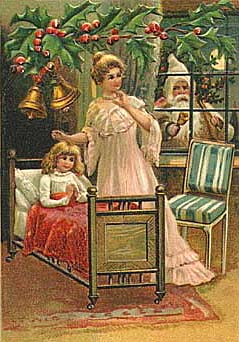|
|
Lines addressed, many years ago,
to the fashionable part of my young countrywomen;
and happy am I to say,
now no longer applicable to them.
|

|
Who in the stream of fashion thoughtless glide;
No modish lay, no melting strain of love
Is here pour'd forth, your tender hearts to move.
Yet think not envious age inspires the song,
Rejecting all our earth-born joys as wrong.
Think me no matron stern who would repress
Each modern grace, each harmless change of dress;
But one whose heart exults to join the band
Where joy and innocence go hand in hand;
One who, while modesty maintains her place,
That sacred charm which heightens every grace,
Complacent, sees your robes excel the snow,
Or borrow colors from the aerial bow.
But in those half-rob'd bosoms are there hid
No thoughts which shame and purity forbid?
Why do those fine-wrought veils around you play,
Like mists which scarce bedim the orb of day?
What mean those careless limbs, that conscious air,
At which the modest blush, the vulgar stare?
Can spotless minds endure the guilty leer,
The sober matron's frown, the witling's sneer?
Are these the charms which, in this age refin'd,
Ensure applause, and captivate the mind?
Are these your boasted powers; are these the arts
Which kindle love, and chain inconstant hearts?
Alas! some angry power, some demon's skill
Hath wrought this strange perversity of will;
|
For sure some foe to innocence beguiles,
When harmless doves attempt the serpent's wiles.
True, Fashion's laws her ready votaries screen,
And ogling beaux exclaim, Oh Goddess! Queen!
But, vile the praise and adoration sought
By arts degrading to each nobler thought!
A base-born love those notes of praise inspires;
That incense rises from unhallowed fires.
If deaf while shame and purity complain,
If reason's gentle voice be rais'd in vain,
Learn from the scented nosegay in your hand
The charms that can alone true love command.
The flaunting tulip you reject with scorn,
Though ting'd with all the hues that deck the morn;
And, careful, search for humbler flowers which bloom
Beneath the grass, yet scatter sweet perfume.
The buds which only half their sweets disclose
You fondly seize, but leave the full-blown rose.
Humble the praise, and trifling the regard
Which ever wait upon the moral bard!
But there remains a hateful truth unsung
Which burns the cheek, and falters on the tongue;
And which, if modesty still hover round,
Each virgin breast with sorrow must confound.
"Those graceful modes," thus say your flattering beaux,
"From ancient times and tastes refin'd arose."
Disgrace not thus the names of Greece and Rome,
Their birth-place must be sought for nearer home.
Shame! shame! heart-rending thought! deep-sinking stain!
That Britain's and Columbia's Fair should deign,
Nay strive, their native beauties to enhance
By arts first taught by prostitutes of France!
O Modesty and Innocence! sweet pair
Of dove-like sisters! still attend our Fair.
Teach them, without your heav'nly influence,
How vain the charms of beauty or of sense.
Invest them with your radiance mild, yet bright;
And give their sparkling eyes a softer light.
Quick-mantling dimples on their cheeks bestow;
And teach them with a purer red to glow;
Let winning smiles too round those dimples gleam,
Like moon-beams on the ruffled stream.
And if resentment on the Muse attend
From those she loves, and truly would befriend,
Tell them, that cruel and unjust their ire;
That she would warm their hearts with holy fire;
And to the charms that soon must pass away
Would add those mental beauties which shall ne'er decay.
|
"Young Clement Moore speaks often of sin, and he lets you know that he's against it. … Moore detested
profane literature, but he also thought it
his bounden duty, as a faculty member of the General Theological Seminary,
to keep close watch on the subverters of public morals, such as
Thomas Jefferson."
 Don Foster, Author Unknown Don Foster, Author Unknown
|
|


